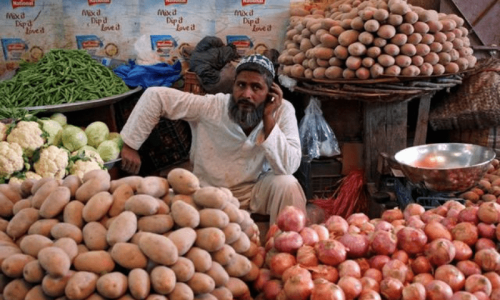ISLAMABAD: Punjab and Balochistan are the two most expensive provinces in terms of the gap between actual and prices fixed by district administration of essential food items, according to the Pakistan Bureau of Statistics (PBS).
PBS has ranked the provinces in terms of the gap between the market prices and those set by district administrations. The exercise is aimed at highlighting issues of governance in controlling the prices.
Put differently, the rankings reflect the performance of various chief secretaries, who serve as the administrative heads of provinces.
In Punjab, Faisalabad leads the ranking with an average gap of 60.15 per cent between market prices of essential food items and the rates set by district administrations. This is followed by Multan at 51.41pc, Bahawalpur at 35.46pc and Rawalpindi at 33.34pc.
Most provincial officials have not even logged into official app to check inflation
On the other end of the scale, Lahore exhibits the lowest average gap at 8.39pc, trailed by Sargodha at 10.89pc, Sialkot at 20.53pc and Gujranwala at 21.92pc. This data underscores the significant variations in price regulation across different cities within the same province.
In Balochistan, the city of Quetta recorded a price gap of 46.86pc closely followed by Khuzdar at 46.29pc. It is important to note that the PBS only monitors prices in these two cities within Balochistan.
In Sindh, Karachi leads with a significant price gap of 44.06pc, followed by Hyderabad at 35.29pc. These cities represent urban Sindh. In contrast, in the interior of Sindh, the city of Larkana has a price gap of 24.62pc, with Sukkur trailing closely at 22.94pc.
In Khyber Pakhtunkhwa, the city of Bannu recorded the highest price gap at 29.66pc, followed by Peshawar at 11.22pc. The PBS only monitors these two cities in the province for comparison.
Meanwhile, in Islamabad, the price gap was recorded at 38.09pc, indicating a lack of effective administration in controlling prices for consumers. This significant discrepancy between market prices of food items and those set by the district administration reflects the poor monitoring by the district administration of the federal capital.
The gaps in prices have been worked out with the help of the Decision Support System for Inflation (DSSI), which reflects the various district administrations’ failure to enforce official prices. The PBS has developed the DSSI to provide information about the prices of essential commodities to the National Price Monitory Committee (NPMC), federal ministries, provincial governments and district administrations.
The DSSI provides a ranking mechanism for districts through which the management at the provincial and federal levels can monitor the price variation on a weekly and monthly basis in 17 major cities of the country.
DSSI monthly report
Amid back-breaking inflation that has remained a cause of concern for the policymakers, high-ranking bureaucrats in two provinces — Sindh and Balochistan — appear least interested in utilising the DSSI, a tool created to monitor the prices of essential consumer goods in the country.
In contrast, the other two provinces — Punjab and KP — showed some interest, with the top bureaucrat from the largest province dedicating the most time to monitoring prices through the DSSI.
The chief secretary of Punjab logged into the DSSI app 21 times in February, while the chief secretary of KP followed with three logins. However, the chief secretaries of Sindh and Balochistan did not log in even once during the same period to monitor the consumer price levels in their respective provinces.
The system is accessible to 17 deputy commissioners in specific districts. Among these, 13, including those from Islamabad, Lahore, Faisalabad, Multan, Hyderabad, Sialkot, Bahawalpur, Peshawar, and Quetta, did not log into the system even one time to oversee consumer prices in 29 days.
The deputy commissioners of Gujranwala, Karachi, Rawalpindi and Sialkot logged into the system only once throughout the month.
Published in Dawn, March 3rd, 2024














































Dear visitor, the comments section is undergoing an overhaul and will return soon.